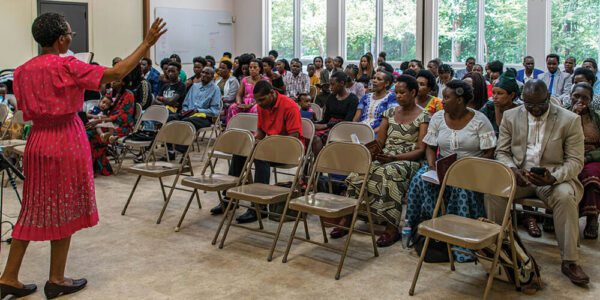While I was in a refugee camp near Goma, in what is now the Democratic Republic of Congo (DRC, formerly Zaire), Nicholas, an Adventist Development and Relief Agency (ADRA) volunteer, told me words of wisdom and prophetic challenges about living in the United States of America.
[Best_Wordpress_Gallery id=”742″ gal_title=”‘Christ in Me’ Ministry Reaches Out to African Refugees in U.S. Local Church”]He said, “If you had a chance to reside in the United States, there are three important tools that you would need in order to be successful: be able to speak English, have good computer skills, and be able to drive a car.”
Now, imagine you are not qualified in any of the above but living in the United States. You are a refugee in need of multidimensional kinds of help.
Our community in the Abahiriwe group in Stone Mountain, Georgia, United States, represents three African countries: Burundi, DRC, and Rwanda. We share the same language of Kinyarwanda. Refugees arrive in the country traumatized by wars and ethnic conflicts in their respective countries. Unable to read nor write, they have lost their cultural and traditional identity and become change resistant. The best tools to give them are English as a second language (ESL) and cultural integration. They also need translators and someone to help them apply for Medicare, food stamps, and medical emergency.
Our mission seeks to help refugees along with other refugee agencies, including International Rescue Committee, New American Pathways, Catholic Charity, and World Relief. “Christ in Me” ministry is a practical way to witness for Christ. Christ’s method is applied in our daily lives and with those we meet. It is a successful tool in reaching people.
According to church co-founder Ellen White, the Savior mingled with men as one who desired their good (opening networks). He showed His sympathy for them (forming attachments), ministered to their needs (meeting needs), and won their confidence. Then He bade them, “Follow Me,” to become disciples (see The Ministry of Healing, p. 143).
Ministry to migrants and refugees is an opportunity for the Adventist Church to show God’s love by demonstrating Christ’s method to beloved, vulnerable human beings. The key word of the ministry is “love” as we expand God’s kingdom relationally. We demonstrate a personal evangelistic role — with the goal of instructing individuals in Bible doctrines and leading them into a commitment to follow Jesus through baptism — by visiting members and non-members, conducting wedding preparations and counseling and baby dedications. We strive to be part of community learning and connection, making sure divine service is organized and done in total surrender and worship to God, and coaching and being the role models to both the youth and adults.
Many refugees are Seventh-day Adventists, and we strive to locate them. We are informed by their family members or relatives worshipping with us. We visit them in their homes, listen to their story with empathy, give them assurance that we are here for them.
When we receive their transfer letters from their churches in Africa, we accept them by profession of faith. We encourage and help them enroll their children in public or Adventist schools; we organize activities that will help them socialize with other community members, like fellowship meals, prayer meetings, small groups, Pathfinders, ESL classes, spiritual revival events, song ministry, and community gardens.
Schools, day care, and community service centers are needed in order to satisfy our migrants’ and refugees’ needs. Those are initiatives that would help us to reach even the least for Christ’s sake.
Though we are limited financially, the local Stone Mountain Seventh-day Adventist Church supports us by providing the needed leadership, training, worship accommodation, and funds that allow us to keep growing and serving.
The original version of this commentary was posted by Southern Tidings.



